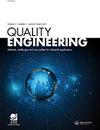Statistical inference in Burr type XII lifetime model based on progressive randomly censored data
IF 2.2
4区 工程技术
Q4 ENGINEERING, INDUSTRIAL
引用次数: 0
Abstract
AbstractCensoring commonly occurs in real-world scenarios, either intentionally or unintentionally. Unintentional (or accidental) censoring usually happens randomly, i.e., it is out of the experimenters’ control, such as broken equipment, lack of follow-up, etc. Experimenters typically use intentional censoring to save experimental time and cost. In this article, we develop frequentist and Bayesian statistical inferential procedures for the parameters and reliability characteristics of the Burr type XII lifetime model under the Koziol-Green model based on progressive randomly censored data. For the frequentist approach, maximum likelihood methods for point and interval estimation are developed. For the Bayesian approach, the Bayes estimates under the squared error loss function (SELF) are evaluated using the Markov Chain Monte Carlo (MCMC) and Tierney-Kadane (T-K) approximation techniques. A Monte Carlo simulation study is used to assess the performance of the proposed estimation procedures. A real data analysis is performed to illustrate the proposed methods. Moreover, obtaining progressive censoring schemes for experimental planning purposes is also discussed.Keywords: Bayesian estimationKoziol-Green modelMarkov chain Monte Carlo methodmaximum likelihood estimationprogressively Type-II censoring AcknowledgementsThe authors would like to thank the guest editor and two anonymous reviewers for their positive remarks and useful comments.Disclosure statementNo potential conflict of interest was reported by the author(s).Additional informationNotes on contributorsRajni GoelDr. Rajni Goel is an assistant professor in the Department of Mathematics, Chandigarh University, Mohali, Punjab, India. She is M.Sc., M.Phil., and Ph. D. in Statistics. She has published Seven research papers in international journals. She is working in the field of Censoring in Survival analysis, Classical & Bayesian inference, and Computational Statistics.Kapil KumarDr. Kapil Kumar is an Associate Professor and Head of the Department of Statistics, Central University of Haryana, Mahendergarh, India. He received his Ph.D. in Statistics from Ch. Charan Singh University, Meerut, India in 2011. He has ab out 12 years of teaching experience. His areas of research are Reliability and Life Testing, Classical Estimation, Bayesian Estimation, Survival analysis and Censored data. He has published 30 research papers and has reviewed more than a hundred research papers for different journals.Hon Keung Tony NgHon Keung Tony Ng is a Professor at the Department of Mathematical Sciences, Bentley University, Waltham, MA, USA. He received a Ph.D. degree in mathematics from McMaster University, Hamilton, ON, Canada, in 2002. His research interests include reliability, censoring methodology, ordered data analysis, nonparametric methods, and statistical inference. Dr. Ng is an Associate Editor for Communications in Statistics, Computational Statistics, IEEE Transactions on Reliability, Journal of Statistical Computation and Simulation, Naval Research Logistics, Sequential Analysis, and Statistics & Probability Letters. He is a Fellow of the American Statistical Association and an Elected Member of the International Statistical Institute.Indrajeet KumarDr. Indrajeet Kumar is an Assistant Professor in the Department of Mathematics at Kalasalingam Academy of Research and Education, Krishnankovil, Tamilnadu, India. He received his Ph.D. in Statistics from the Central University of Haryana, Mahendergarh, India in 2022. He has about one year of Data Scientist and two years of teaching experience. His areas of research are Reliability and Life Testing, Classical Estimation, Bayesian Estimation, Survival Analysis, Quality Control, Data Science and Censored data. He has published 07 research papers and also reviewed several research papers for different journals.基于渐进式随机截尾数据的Burr型XII寿命模型的统计推断
摘要审查通常发生在现实场景中,有意或无意。无意(或意外)审查通常是随机发生的,即不在实验者的控制范围内,如设备损坏、缺乏跟踪等。实验者通常使用有意的审查来节省实验时间和成本。本文建立了基于渐进式随机截尾数据的Koziol-Green模型下Burr型XII寿命模型的参数和可靠性特性的频率和贝叶斯统计推理方法。对于频域方法,提出了点估计和区间估计的极大似然方法。对于贝叶斯方法,使用马尔可夫链蒙特卡罗(MCMC)和Tierney-Kadane (T-K)近似技术评估平方误差损失函数(SELF)下的贝叶斯估计。蒙特卡罗模拟研究用于评估所提出的估计过程的性能。通过一个实际的数据分析来说明所提出的方法。此外,还讨论了为实验规划目的而获得的渐进式滤波方案。关键词:贝叶斯估计;koziol - green模型;马尔可夫链;蒙特卡罗方法;最大似然估计;渐进式ii型审查致谢作者感谢特邀编辑和两位匿名审稿人的积极评论和有用的意见。披露声明作者未报告潜在的利益冲突。其他信息贡献者说明rajni GoelDr。Rajni Goel,印度旁遮普莫哈里市昌迪加尔大学数学系助理教授。她是文学硕士,哲学硕士。获得统计学博士学位。她在国际期刊上发表了七篇研究论文。她的研究领域包括:生存分析中的审查、经典与贝叶斯推理、计算统计学。Kapil KumarDr。Kapil Kumar是印度马亨德加尔邦哈里亚纳邦中央大学副教授兼统计系主任。他于2011年获得印度密鲁特查兰辛格大学统计学博士学位。他有将近12年的教学经验。他的研究领域是可靠性和寿命测试,经典估计,贝叶斯估计,生存分析和审查数据。他发表了30篇研究论文,并在不同的期刊上审阅了100多篇研究论文。Hon Keung Tony NgHon Keung Tony Ng是美国马萨诸塞州沃尔瑟姆宾利大学数学科学系教授。2002年获加拿大安大略省汉密尔顿市麦克马斯特大学数学博士学位。他的研究兴趣包括可靠性、审查方法、有序数据分析、非参数方法和统计推断。他是《统计通讯》、《计算统计》、《IEEE可靠性交易》、《统计计算与仿真杂志》、《海军研究物流》、《序列分析》和《统计与概率快报》的副主编。他是美国统计协会的会员和国际统计研究所的当选成员。Indrajeet KumarDr。Indrajeet Kumar是印度泰米尔纳德邦Krishnankovil Kalasalingam研究与教育学院数学系的助理教授。他于2022年获得印度马亨德加尔邦哈里亚纳邦中央大学统计学博士学位。他有大约一年的数据科学家和两年的教学经验。他的研究领域是可靠性和寿命测试、经典估计、贝叶斯估计、生存分析、质量控制、数据科学和审查数据。他发表了07篇研究论文,并在不同的期刊上发表了几篇研究论文。
本文章由计算机程序翻译,如有差异,请以英文原文为准。
求助全文
约1分钟内获得全文
求助全文
来源期刊

Quality Engineering
ENGINEERING, INDUSTRIAL-STATISTICS & PROBABILITY
CiteScore
3.90
自引率
10.00%
发文量
52
审稿时长
>12 weeks
期刊介绍:
Quality Engineering aims to promote a rich exchange among the quality engineering community by publishing papers that describe new engineering methods ready for immediate industrial application or examples of techniques uniquely employed.
You are invited to submit manuscripts and application experiences that explore:
Experimental engineering design and analysis
Measurement system analysis in engineering
Engineering process modelling
Product and process optimization in engineering
Quality control and process monitoring in engineering
Engineering regression
Reliability in engineering
Response surface methodology in engineering
Robust engineering parameter design
Six Sigma method enhancement in engineering
Statistical engineering
Engineering test and evaluation techniques.
 求助内容:
求助内容: 应助结果提醒方式:
应助结果提醒方式:


